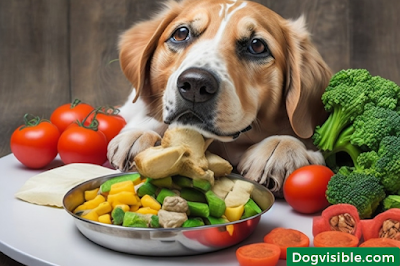How Much to Feed a Lab Puppy - Dogvisible
Are you a new owner of a Labrador Retriever puppy? Congratulations! Labrador Retrievers are among the most popular dog breeds in the world, known for their friendly and outgoing personality. However, as a new puppy owner, you may be wondering how much to feed a lab puppy.
Feeding your lab puppy the right amount of food is crucial for their growth and development. Overfeeding can lead to obesity, while underfeeding can result in stunted growth and malnutrition. In this guide, we will provide you with all the information you need to know about how much to feed a lab puppy.
Labrador Retrievers are active and energetic dogs, which means they require a well-balanced diet to meet their nutritional needs. As a puppy, your lab's diet will differ from that of an adult dog. Puppies require more frequent meals and different types of food to support their rapid growth and development. So, let's dive in and learn how much to feed a lab puppy.
IN THIS ARTICLE
- How Much to Feed a Lab Puppy?
- Factors to Consider When Feeding Your Lab Puppy
- Types of Food for Lab Puppies
- How to Choose the Right Food to Feed a Lab Puppy?
- Tips for Feeding Your Lab Puppy
- How Much to Feed a Lab Puppy Based on Age?
- How Much to Feed a Lab Puppy Based on its Weight?
- How to Monitor Your Lab Puppy's Weight?
- Importance of a Balanced Diet for Lab Puppies
- Common Feeding Mistakes to Avoid Feed a Lab Puppy
- Summary
- Related FAQ
- Related Articles
How Much to Feed a Lab Puppy?
The amount of food your lab puppy needs depends on their age, weight, and activity level. Generally, lab puppies should be fed three to four small meals a day until they are six months old. After six months, you can reduce their meals to two to three a day.
The best way to determine how much to feed a lab puppy is by using their weight as a guideline. The general rule of thumb is to feed your lab puppy 1.5 to 2 cups of food per day. However, this can vary depending on your puppy's weight and activity level.
Factors to Consider When Feeding Your Lab Puppy
Several factors come into play when deciding how much to feed your Lab puppy. These factors include age, weight, activity level, body condition score, and health conditions.
1. Age of Lab Puppy
Puppies have different nutritional needs than adult dogs. The amount and type of food your Lab puppy needs will depend on its age. Younger puppies need more frequent feedings than older puppies.
2. Weight of Lab Puppy
The weight of your Lab puppy is another important factor to consider when determining how much to feed it. Overfeeding can lead to obesity, which can cause health problems in the long run. Underfeeding, on the other hand, can lead to malnutrition and stunted growth.
3. Activity Level
The activity level of your Lab puppy will also affect how much to feed it. More active puppies will need more calories than those that are less active.
4. Body Condition Score
The body condition score of your Lab puppy is a measure of its body fat percentage. You should be able to feel its ribs but not see them. If your puppy is underweight or overweight, you will need to adjust its feeding accordingly.
5. Health Conditions
Some health conditions may affect how much to feed your Lab puppy. For example, if your puppy has diabetes or kidney disease, it may need a special diet.
Types of Food for Lab Puppies
There are several types of food available for Lab puppies, including dry kibble, wet food, raw food, and homemade food. Each type has its advantages and disadvantages.
Dry Kibble
Dry kibble is the most common type of food for Lab puppies. It is easy to store, convenient to feed, and provides a balanced diet. Look for high-quality brands that use real meat as the primary ingredient and avoid fillers such as corn or soy.
Wet Food
Wet food is another option for Lab puppies. It has a higher moisture content than dry kibble, which can help keep your puppy hydrated. Wet food is also usually more palatable than dry kibble, which can be helpful if your puppy is a picky eater.
Raw Food
Raw food diets are becoming more popular for dogs. These diets consist of raw meat, bones, and organs, and aim to mimic what dogs would eat in the wild. However, it is essential to ensure that raw food diets are nutritionally balanced, and there is a risk of foodborne illness with raw meat.
Homemade Food
Some owners prefer to make their dog food. This can be a great way to ensure that your puppy is getting high-quality ingredients and avoiding additives and preservatives. However, it is essential to consult with a veterinarian or canine nutritionist to ensure that the homemade food is nutritionally balanced.
How to Choose the Right Food to Feed a Lab Puppy?
Now that you know how much to feed a lab puppy, let's talk about choosing the right food. It's essential to select a high-quality puppy food that provides your lab with all the essential nutrients they need for growth and development. When choosing puppy food, look for the following -
1. High-Quality Protein Sources - The first ingredient should be a high-quality protein source, such as chicken or lamb.
2. Whole Grains - Look for whole grains, such as brown rice or oats, as they are a good source of fiber and essential vitamins and minerals.
3. Fruits and Vegetables - These provide important antioxidants and other essential nutrients.
4. No Artificial Preservatives or Additives - Avoid foods that contain artificial preservatives or additives.
5. AAFCO Certified - Ensure the food you choose is certified by the Association of American Feed Control Officials (AAFCO) for complete and balanced nutrition.
Tips for Feeding Your Lab Puppy
- Stick to a regular feeding schedule.
- Use measuring cups to ensure that you are feeding the correct amount.
- Avoid giving your puppy table scraps or human food.
- Provide plenty of fresh water at all times.
- Monitor your puppy's weight and adjust feeding accordingly.
- Gradually transition to a new food to avoid digestive upset.
- Consider using puzzle feeders or slow-feed bowls to encourage slower eating.
How Much to Feed a Lab Puppy Based on Age?
The amount of food your Lab puppy needs will depend on its age. Here are some general guidelines for how much to feed a Lab puppy based on its age:
6-12 Weeks Old Lab Puppy
At this age, your Lab puppy will need to be fed four times a day. Each meal should consist of ¼ to ½ cups of food.
3-6 Months Old Lab Puppy
At this age, your Lab puppy can be fed three times a day. Each meal should consist of ½ to 1 cup of food.
6-12 Months Old Lab Puppy
At this age, your Lab puppy can be fed twice a day. Each meal should consist of 1 to 2 cups of food.
How Much to Feed a Lab Puppy Based on its Weight?
- 5-10 pounds: 1/2 - 1 cup per day
- 10-20 pounds: 1 - 1 1/2 cups per day
- 20-30 pounds: 1 1/2 - 2 cups per day
- 30-40 pounds: 2 - 2 1/2 cups per day
- 40-50 pounds: 2 1/2 - 3 cups per day
- 50-60 pounds: 3 - 3 1/2 cups per day
- 60-70 pounds: 3 1/2 - 4 cups per day
Keep in mind that these are only general guidelines, and you should consult with your vet to determine the right amount of food for your lab puppy.
How to Monitor Your Lab Puppy's Weight?
It's crucial to monitor your lab puppy's weight regularly to ensure they are getting the right amount of food. Overfeeding can lead to obesity, while underfeeding can cause stunted growth and malnutrition. Here's how to monitor your lab puppy's weight -
1. Weigh your Puppy Regularly
Use a kitchen scale to weigh your puppy every week or two. This will help you track their weight gain and adjust their food intake accordingly.
2. Watch for Signs of Overfeeding
If your puppy becomes overweight or is gaining weight too quickly, it's time to adjust their food intake. Look for signs of overfeeding, such as a round belly or excessive weight gain.
3. Consult With Your Vet
If you're unsure how much to feed your lab puppy, consult with your vet. They can provide you with a personalized feeding plan based on your puppy's weight, age, and activity level.
Importance of a Balanced Diet for Lab Puppies
A balanced diet is essential for the overall health and well-being of your Lab puppy. A proper diet ensures that your puppy gets all the necessary nutrients, vitamins, and minerals needed for growth, development, and optimal health. A balanced diet also helps to maintain a healthy weight, prevent obesity, and reduce the risk of health problems such as hip dysplasia, arthritis, and diabetes.
Common Feeding Mistakes to Avoid Feed a Lab Puppy
Feeding your lab puppy the right amount of food is essential for their health and well-being. Here are some common feeding mistakes to avoid -
- Overfeeding: Overfeeding can lead to obesity and other health problems. Stick to the recommended portion sizes and avoid giving your puppy table scraps or treats that are high in fat and calories.
- Underfeeding: Underfeeding can cause stunted growth and malnutrition. Make sure your puppy is getting enough food to support their growth and development.
- Feeding the Wrong Type of Food: Make sure you're feeding your lab puppy a high-quality puppy food that is designed to meet their nutritional needs. Avoid feeding them adult dog food or food that is not AAFCO certified.
- Inconsistency: Establish a consistent feeding routine and stick to it. Feeding your puppy at different times or changing their food suddenly can cause digestive upset and other problems.
SUMMARY
Feeding your lab puppy the right amount of food is essential for their health and well-being. It's important to establish a feeding routine and monitor their weight regularly to ensure they are getting the right amount of food. Avoid common feeding mistakes, such as overfeeding or feeding the wrong type of food. If you're unsure how much to feed your lab puppy, consult with your vet.
REMEMBER, every lab puppy is unique, and their nutritional needs may vary based on their weight, age, and activity level. By providing your lab puppy with a portion of high-quality puppy food and a consistent feeding routine, you can help them grow up healthy and strong.
RELATED FAQ
Here are some frequently asked questions about feeding lab puppies:
1. How often should I feed my lab puppy?
Lab puppies should be fed three to four small meals a day until they are six months old. After six months, you can reduce their meals to two to three a day.
2. How much food should I feed my lab puppy?
The amount of food your lab puppy needs depends on their weight, age, and activity level. Generally, lab puppies should be fed 1.5 to 2 cups of food per day.
3. Can I feed my lab puppy human food?
It's best to stick to high-quality puppy food that is designed to meet your lab puppy's nutritional needs. Avoid giving them human food or table scraps, as these can be high in fat and calories.
4. What should I do if my lab puppy is overweight?
If your lab puppy is overweight, it's time to adjust their food intake. Consult with your vet to determine the right amount of food for your puppy's weight and activity level.
5. What if my lab puppy is a picky eater?
Some lab puppies can be picky eaters. Try adding some warm water or low-sodium chicken broth to their food to make it more appealing. You can also try different types of food or feed them in a quiet, distraction-free environment.
6. Can I free-feed my lab puppy?
Free-feeding, or leaving food out for your puppy to eat whenever they want, is not recommended. It can lead to overeating and obesity. Stick to a regular feeding schedule and portion sizes.
7. Can I feed my Lab puppy raw meat?
Raw food diets can be a healthy option for dogs, but it is essential to ensure that the diet is nutritionally balanced and free of bacteria.
8. Can Lab puppies eat human food?
While some human foods are safe for dogs, it is generally best to stick to high-quality dog food to ensure that your puppy gets all the necessary nutrients.
9. Should I use a slow-feed bowl for my Lab puppy?
Slow-feed bowls can be a helpful tool to encourage slower eating and prevent overeating. Consider using one if your puppy tends to eat too quickly.
10. Can Lab puppies eat wet food?
Wet food can be a great option for Lab puppies, as it is usually more palatable and can help keep your puppy hydrated. However, be sure to choose a high-quality brand that is nutritionally balanced.
11. How can I tell if my Lab puppy is getting enough food?
You can monitor your puppy's weight and body condition to ensure that it is getting enough food. Consult with your veterinarian if you have any concerns.







